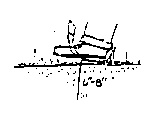Analyzing your soil’s fertility lets you apply supplementary nutrients to suit the needs of the plants you wish to grow. Proper lime and fertilizer application reduces wasted nutrients and stress on plants. To measure soil fertility accurately, however, you must prepare a representative sample, which means you must sample more than one spot within the area of concern. For large plantings or areas of plants with specialized needs, such as lawns, acid-loving plants, and vegetable gardens, separate samples will allow proper recommendations for each site. Before starting, determine that the soil is dry enough to sample by squeezing a handful. It is dry enough if the soil crumbles when you open your fist.
For a pH test, place 1/2 cup of the mix in a clean container. For the complete test, keep a pint of the soil mix.
A pH test indicates the level of soil acidity (pH <7.0) or alkalinity (pH > 7.0). Turf, flowers and most vegetables grow best in soils that are slightly acidic (pH 6.0 to 6.5). Most New Jersey soils are naturally too acid except for acid-loving plants, such as rhododendrons and azaleas. If the pH of the soil is too low, add lime before starting a new lawn area or garden to give it time to react with the soil to raise the pH to proper levels. Raising the soil pH too high (above pH 7.0) can decrease the availability of some nutrients, so adding more lime than is recommended is not beneficial.
The office of Rutgers Cooperative Extension of Mercer County can analyze soil for pH (acidity). The soil sample should be taken as directed above Samples should be brought to the office and the results will be mailed to you.
Soil Test for Major Nutrients
The Rutgers University Soil Test Lab can perform a test for major nutrients and soil pH. The analysis includes soil pH (acidity), and potassium, phosphorus, calcium, and magnesium levels. A recommendation for limestone and fertilizer is provided. Soils should be tested every 3 to 5 years to insure accurate limestone and fertilizer application and to maximize growing conditions for your plants. Visit their web site for more information.
You can pick up a kit that contains a mailer, a plastic bag for the soil, and a questionnaire about the site from the Extension office. The kit can be mailed directly to the Soils Lab in New Brunswick. Test results and recommendations will be mailed to you.





